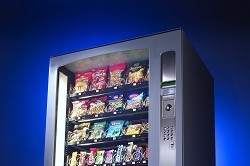Smart device makes vending machines more environment-friendly
Vending machines dispensing chilled drinks and other refrigerated edible products face a looming deadline to move to eco-friendly refrigerant gases by the end of this decade. The EXPAND project has developed an innovative expansion valve that does away with environmentally damaging HFC (Hydrofluorocarbon) refrigerant technology that still dominates the vending machine industry in Europe. At the same time the device, which is regulated electronically using specific software, makes vending machines more energy efficient. ‘There is a strong need for the industry to move to more natural gases now,’ says David Irvine of consortium member the European Vending Association (EVA) in Brussels, as the main HFC coolants are known to contribute to global warming. New EU legislation banning two refrigerants commonly used in the vending industry will soon apply, with HFC-R404A banned from 2020 and HFC-R134A from 2022. When the EXPAND project started in 2013 there was no suitable commercially available device using natural refrigerant gases for vending machine manufacturers to switch to Mr Irvine explains. ‘We had to start from zero. EXPAND’s objective was to develop a final prototype to present to the vending machine industry.’ Japan’s vending machines have already switched to natural gases but their machines are different from European ones, as are US vending machines, so existing eco-friendly technology cannot simply be imported, he says. Dispensing with HFCs The innovative expansion valve, developed and tested by a group of SMEs as part of the project and now at the final prototype stage, can use either carbon dioxide or hydrocarbons, making it applicable for a range of small commercial cooling systems. Small vending machines’ cooling systems typically use a capillary tube system designed to cope with a fixed load. However an expansion valve - which controls the flow of the refrigerant and regulates the pressure which changes its state from liquid to gas - is far more efficient as it adapts to a wider range of ambient temperature conditions, Mr Irvine explains. ‘There is nothing like this for small vending units,’ says Mr Irvine. Existing expansion valves are expensive and inefficient and are intended for much larger, heavy duty refrigeration systems. The valve developed by EXPAND has another major advantage, at a time when an energy labelling scheme similar to that for domestic refrigerators is being introduced. Testing the device in vending machines under laboratory conditions produced a potential energy saving of up to 20 %. A smart controller, designed by Bulgarian IT company InRay Solutions, electronically regulates the opening and closing of the valve. Unlike the old capillary system, ‘you can optimise the valve for changing conditions. This is where the energy efficiency gains come in,’ Mr Irvine says. This is important as vending machines consume more energy than other industrial refrigeration units when they are opened for restocking and warm air enters the system. Final prototype The final prototype, which includes the smart controller, will be presented by the EVA to manufacturers at the beginning of 2017 to test in their own machines so that small adjustments can be made. After that, ‘there is nothing stopping it from going into production in 2017,’ Mr Irvine says. The expansion valve can be manufactured using low cost techniques that do not require major investment in production and tooling, he adds. This makes it suitable for low-to-medium size production volumes and in many cases the rejigged refrigeration unit using the valve can be slotted into existing vending machines. According to the EVA, which comprises 13 national associations that represent small and medium enterprises manufacturing vending industry components as well as those supplying drinks and confectionary for the machines, 1.2 million commercial machines come onto the European market each year. The number is expected to grow to 1.6 million by 2025.







